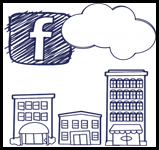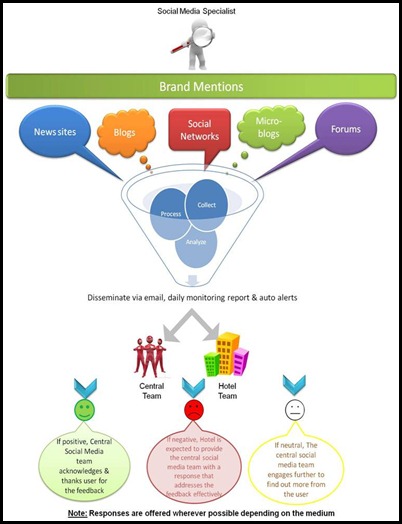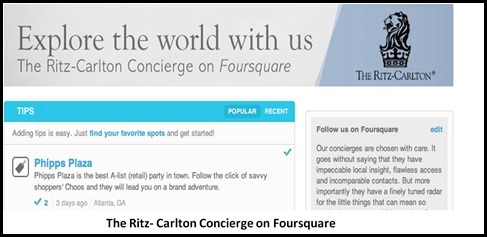 Hospitality was not among the sectors which were early adopters of social media but now it’s become an integral part of their marketing and other activities, and more importantly for the online reputation management and customer relationships. Previously, the online activities of hotels, apart from their own website, were limited to all they can do on TripAdvisor; but the scenario is fast changing. The most important thing in hospitality industry is to provide a personal touch while servicing customers and social media has been spearheading the efforts. Here’s a look at how the hospitality players could leverage (and are leveraging) the social medium.
Hospitality was not among the sectors which were early adopters of social media but now it’s become an integral part of their marketing and other activities, and more importantly for the online reputation management and customer relationships. Previously, the online activities of hotels, apart from their own website, were limited to all they can do on TripAdvisor; but the scenario is fast changing. The most important thing in hospitality industry is to provide a personal touch while servicing customers and social media has been spearheading the efforts. Here’s a look at how the hospitality players could leverage (and are leveraging) the social medium.
Building the brand with effective Online Reputation Management
In today’s scenario, travelers are voicing and seeking opinions on review sites, social networks and blogs, propelling the relevance of online reputation to a level of importance that rivals price, location and brand in influencing purchase decisions. And thus, it is necessary to create an end to end process to effectively manage the online reputation of and to enhance the overall online health of the brand which in turn influences the traveler’s choice in selecting a hotel.
ITC Hotels built a three-fold strategy for the same and cracked it:
1. A real time reporting mechanism to track and monitor all relevant mentions across platforms.
2. Identify & engage with bloggers, travelers, & other influencers to generate credible online positive impressions.
3. Engaging with guests in real time by tacking foursquare check-ins and tweets, and effective conflict resolution over Twitter.
Building credibility with Foursquare concierge:
Ritz Carlton took and interesting and indirect approach to use Foursquare by creating a concierge on the platform. They simply put exclusive tips at the places around their properties are situated. With having presence in multiple locations and countries it is mammoth task, but sure worth the effort as it gives their visitors (and other Foursquare users too) a perfect ‘local experience’. For this purpose they created a Ritz Carlton page on Foursquare and started posting interesting tips about nearby landmarks, restaurants, and hidden gems for each of their 75 locations. It was to serve a dual purpose of guiding their guests through the real world, and also to extend their brand to the larger foursquare community. Within a week of launching this campaign, their Foursquare page gained 1000+ followers.
Building online properties to increase brand recall:
ITC Hotels again have recently started two weekly activities #WineWednesday and #InspiringTastes on twitter. The objective of both the activities is to create valuable content and information for the audience on twitter around the subjects ‘wine’ and ‘food’ respectively. Both properties have three levels of activities:
1. Tweeting exclusive tips, information on the subject.
2. Organizing interactive Tweet-Chats with experts on topics and answer audience queries.
3. Organizing physical Tweet-Ups on the subjects.
Currently, both the activities are in the inception stage but they are gradually picking up pace with a 200% retweet rate and a reach of 25000+ for an hour long interactive TweetChat with 10+ audience questions.
Social Loyalty Programs:
It is a known fact that acquiring a new customer costs 5-10 times more than selling to an existing customer. An effective social loyalty program establishes this as a proven fact and while a lot of hotel properties are creating shockwaves in the space there remains still a huge segment who are still exploring their options.
The only difference in simple loyalty program and social loyalty program is in the former points are earned on every purchase, and in the later points are earned for every social action i.e. share, like, comment etc. While helping repeat sales the social loyalty program is also an important tool to increase the social mentions of the brand, and thus the reach and voice.
Following are the two key things to be kept in mind while creating a social loyalty program:
1. Simple point system: never-ever confuse the audience with complex systems.
2. Keep a tier-system in place: the rewards should increase exponentially for loyal customers.
What do you think about some of these campaigns? Do you think they are potent enough to grab eyeballs? Share your views on the same in the comments section below. It’s always great to hear from you all.
Comments
Tags: food, Foursquare, Hotels, ITC, Loyalty, Online Reputation Management, Ritz-Carlton, strategy, wine


[…] written this post for Windchimes Blog, read the full post here Tags: featured, hospitality marketing, social […]
Good post. But Foursquare will have problems if they can”t bridge the gap between a person volunteering this personal information and gaining some benefit. The gamification only goes so far. Individual companies can learn to use tools to create an award system, but the tool itself has to make it easier for users to answer the question “What”s in it for me” so as to why I should be so open with my check-in data.
I use Foursquare but I can tell you after you look back over a period of time, you begin to wonder “so what?”. What did I really get for that investment in my time. And Foursquare does not currently have an answer for these questions.
Quite an insightful point raised, Tim. Unless the users are made aware of an incentive, why would they keep their check-in data visible to public? The tools employed would have to be simple in order to convey the benefits of letting brands access user data or have a quid pro quo for instant gratification.